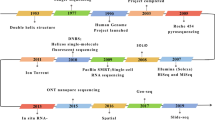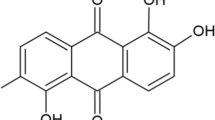Abstract
The transcriptional activity of genes encoding cancer/testis antigens (CTA) and its regulation in colorectal cancer (CRC) is not well understood. The expression of CTA coding genes (CT genes) and possible mechanisms for its regulation, including expression and copy number of DNA methyltransferase genes, copy number of CT genes, microRNA expression, and LINE-1 methylation in CRC were analyzed in this study. The relative expression levels and copy number variation of 19 genes, MAGE-A1, -A2, -A3, -A4, -B1, -B2, GAGE-1, -3, -4, MAGEC1, BAGE, XAGE3, NY-ESO1, SSX2, SCP1, PRAME1, DNMT1, DNMT3A, and DNMT3B, were determined using real-time quantitative PCR. Quantitative methylation of LINE-1 CpG sites was evaluated by pyrosequencing, and multiple parallel sequencing was used to determine the level of microRNA expression. It was found that in colon tumor tissue a multidirectional destabilization of the transcriptional activity of DNMT3A and DNMT3B, associated with copy number variation and a change in expression of the CT genes BAGE, SSX2 and PRAME1, is observed. A strong positive correlation was found between copy number and expression of the BAGE, SSX2, and PRAME1 genes. As a result of multiple parallel sequencing, 6 differentially expressed microRNAs (hsa-miR-143-3p, hsa-miR-26a-5p, hsa-miR-25-3p, hsa-miR-92a-3p, hsa-miR-21-5p, and hsa-let-7i-5p), targeting the CT genes GAGE1, SSX2, PRAME, SCP1, and the gene for DNA methyltransferase 3A (DNMT3A), were found. Data on the mechanisms of the transcriptional activity regulation of CT genes in malignant colon tumors are important for the development of CTA-dependent immunotherapeutic approaches for the treatment of this type of tumor.









Similar content being viewed by others
REFERENCES
Kit O.I., Soldatova K.I., Kutilin D.S., Vodolazhsky D.I. 2018. Cancer-testis antigens in diagnosis of colon tumors. Sovrem. Probl. Nauki Obraz.2, 1‒10. https://doi.org/10.17513/spno.27449
Bray F., Ferlay J., Soerjomataram I., Siegel R.L., Torre L.A., Jemal A. 2018. Global cancer statistics 2018: GLOBOCAN estimates of incidence and mortality worldwide for 36 cancers in 185 countries. CA Cancer J. Clin.68 (6), 394‒424.
Vodolazhsky D.I., Kutilin D.S., Mogushkova Kh.A., Kit O.I. 2017. Transcriptional profile of cancer-testis antigens in patients with uterine corpus cancer. Uasp. Sovrem. Onkol.4 (4), 135.
Mahmoud A.M. 2018 Cancer testis antigens as immunogenic and oncogenic targets in breast cancer. Immunotherapy. 10 (9), 769–778. https://doi.org/10.2217/imt-2017-0179
van der Bruggen P., Traversari C., Chomez P., Lurquin C., De Plaen E., Van den Eynde B., Knuth A., Boon T.A. 2007. Gene encoding an antigen recognized by cytolytic T lymphocytes on a human melanoma. J. Immunol.178(5), 2617‒2621.
Vodolazhsky D.I., Kutilin D.S., Mogushkova Kh.A., Kit O.I. 2018. Specific features of transcription activity of cancer-testis antigens in patients with metastatic and non-metastatic breast cancer. Bull. Exp. Biol. Med.165 (3), 382‒385.
Kutilin D.S., Nikitin I.S., Kit O.I. 2019. Features of some transcription factors gene expression in the malignancy tissues of the corpus uteri. Usp. Sovrem. Onkol.6 (1), 57‒62.
Vandesompele J., De Preter K., Pattyn F., Poppe B., Van Roy N., De Paepe A., Speleman F. 2002. Accurate normalization of real-time quantitative RT-PCR data by geometric averaging of multiple internal control genes. Genome Biol. 3 (7), 1‒12.
Vodolazhsky D.I., Kutilin D.S., Mogushkova Kh.A., Kit O.I. 2018. Trancriptional profile of testicular cancer antigens in patients with mammary cancer. Med. Immunol. 20 (3), 383‒390.
Kutilin D.S., Airapetova T.G., Anistratov P.A., Pyltsin S.P., Leiman I.A., Karnaukhov N.S., Kit O.I. 2019. Copy number variation in tumor cells and extracellular DNA in patients with lung adenocarcinoma. Bull. Exp. Biol. Med.167 (6), 771–778.
Hackenberg M., Sturm M., Langenberger D., Falcón-Pérez J.M., Aransay A.M. 2009. miRanalyzer: A microRNA detection and analysis tool for next-generation sequencing experiments. Nucleic Acids Res. 37, 68‒76.
Love M.I., Huber W., Anders S. 2014. Moderated estimation of fold change and dispersion for RNA-seq data with DESeq2. Genome Biol. 15, 550.
Ding J., Li X., Hu H. 2016. TarPmiR: A new approach for microRNA target site prediction. Bioinformatics. 32 (18), 2768‒2775. https://doi.org/10.1093/bioinformatics/btw318
Shantha Kumara H.M., Grieco M.J., Caballero O.L., Su T., Ahmed A., Ritter E., Gnjatic S., Cekic V., Old L.J., Simpson A.J., Cordon-Cardo C., Whelan R.L. 2012. MAGE-A3 is highly expressed in a subset of colorectal cancer patients. Cancer Immun.12, 16.
Li M., Yuan Y.H., Han Y., Liu Y.X., Yan L., Wang Y., Gu J. 2005. Expression profile of cancer-testis genes in 121 human colorectal cancer tissue and adjacent normal tissue. Clin. Cancer Res.11 (5), 1809‒1814.
Grunau C., Brun M.E., Rivals I., Selves J., Hindermann W., Favre-Mercuret M., Granier G., De Sario A. 2008. BAGE hypomethylation, a new epigenetic biomarker for colon cancer detection. Cancer Epidemiol. Biomarkers Prev. 17(6), 1374‒1379.
Al-Khadairi G., Decock J. 2019. Cancer testis antigens and immunotherapy: where do we stand in the targeting of PRAME? Cancers (Basel). 11 (7), E984.
Epping M.T., Wang L., Edel M.J., Carlée L., Hernandez M., Bernards R. 2005. The human tumor antigen PRAME is a dominant repressor of retinoic acid receptor signaling. Cell. 122 (6), 835–847.
Al-Khadairi G., Naik A., Thomas R., Al-Sulaiti B., Rizly S., Decock J. 2019. PRAME promotes epithelial-to-mesenchymal transition in triple negative breast cancer. J. Transl. Med.17 (1), 9.
de Bruijn D.R., dos Santos N.R., Kater-Baats E., Thijssen J., van den Berk L., Stap J., Balemans M., Schepens M., Merkx G., van Kessel A.G. 2002. The cancer-related protein SSX2 interacts with the human homologue of a Ras-like GTPase interactor, RAB3IP, and a novel nuclear protein, SSX2IP. Genes Chromosomes Cancer. 34 (3), 285‒298.
Waterhouse A., Bertoni M., Bienert S., Studer G., Tauriello G., Gumienny R., Heer F.T., de Beer T.A.P., Rempfer C., Bordoli L., Lepore R., Schwede T. 2018. SWISS-MODEL: Homology modelling of protein structures and complexes. Nucleic Acids Res. 46, 296‒303.
Binder J.X., Pletscher-Frankild S., Tsafou K., Stolte C., O’Donoghue S.I., Schneider R., Jensen L.J. 2014. COMPARTMENTS: Unification and visualization of protein subcellular localization evidence. Database (Oxford). 2014, bau012. https://doi.org/10.1093/database/bau012
Sigalotti L., Fratta E., Coral S., Tanzarella S., Danielli R., Colizzi F., Fonsatti E., Traversari C., Altomonte M., Maio M. 2004. Intratumor heterogeneity of cancer/testis antigens expression in human cutaneous melanoma is methylationregulated and functionally reverted by 5-aza-20-deoxycytidine. Cancer Res. 64, 9167‒9171.
Bestor T.H. 2000. The DNA methyltransferases of mammals. Hum. Mol. Genet.9 (16), 2395‒2402.
Robertson K.D. 2002. DNA methylation and chromatin unraveling the tangled web. Oncogene. 35, 5361–5379.
Kohli R.M., Zhang Y. 2013. TET enzymes, TDG and the dynamics of DNA demethylation. Nature. 502 (7472), 472‒479.
Zemach A., McDaniel I.E., Silva P., Zilberman D. 2010. Genome-wide evolutionary analysis of eukaryotic DNA methylation. Science. 328 (5980), 916‒919.
Wade P.A. 2001. Methyl CpG binding proteins: Coupling chromatin architecture to gene regulation. Oncogene. 20, 3166‒3173.
De Smet C., Lurquin C., Lethe B., Martelange V., Boon T. 1999. DNA methylation is the primary silencing mechanism for a set of germ line- and tumor-specific genes with a CpG-rich promoter. Mol. Cell Biol. 19, 7327‒7335.
Sigalotti L., Coral S., Nardi G. et al. 2002. Promoter methylation controls the expression of MAGE2, 3 and 4 genes inhumancutaneous melanoma. Int. J. Cancer. 25, 16‒26.
Brenner C., Deplus R., Didelot C., Loriot A., Viré E., De Smet C., Gutierrez A., Danovi D., Bernard D., Boon T., Pelicci P. G., Amati B., Kouzarides T., de Launoit Y., Di Croce L., Fuks F. 2005. Myc represses transcription through recruitment of DNA methyltransferase corepressor. EMBO J.24 (2), 336‒346.
Jia Y., Li P., Fang L., Zhu H., Xu L., Cheng H., Zhang J., Li F., Feng Y., Li Y., Li J., Wang R., Du J.X., Li J., Chen T., et al. 2016. Negative regulation of DNMT3A de novo DNA methylation by frequently overexpressed UHRF family proteins as a mechanism for widespread DNA hypomethylation in cancer. Cell Discov. 2, 16007.
Rhee I., Jair K.W., Yen R.W., Lengauer C., Herman J.G., Kinzler K.W., Vogelstein B., Baylin S.B., Schuebel K.E. 2000. CpG methylation is maintained in human cancer cells lacking DNMT1. Nature. 404 (6781), 1003‒1007
Pradhan S., Bacolla A., Wells R.D., Roberts R.J. 1999. Recombinant human DNA (cytosine-5. methyltransferase): 1. Expression, purification, and comparison of de novo and maintenance methylation. J. Biol. Chem.274 (46), 33002‒33010.
Vasilyev S.A., Tolmacheva E.N., Lebedev I.N. 2016. Epigenetic regulation and role of LINE-1 retrotransposon in embryogenesis. Russ. J. Genet.52 (12), 1219‒1226.
Mustafin R.N., Khusnutdinova E.K. 2017. Epigenetics of carcinogenesis. Kreat. Khirurg. Onkol.7 (3), 60‒67.
Funding
This work was financially supported by the Ministry of Health of the Russian Federation within the State Task “A study of aberrant regulation of the transcriptional activity of a gene pattern in the development of the malignant transformation of tissues of various nosologies” (project no. AAAA-A18-118072790013-1).
Author information
Authors and Affiliations
Corresponding author
Ethics declarations
Conflict of interests. The authors declare that they have no conflict of interest.
Statement of compliance with standards of research involving humans as subjects. All procedures performed in the present study were in accordance with the ethical standards of the institutional research ethics committee and with the 1964 Helsinki Declaration and its later amendments or comparable ethical standards. Informed consent was obtained from all individual participants involved in the study.
Additional information
Translated by D. Novikova
Abbreviations: CRC, colorectal cancer; CNV, copy number variation; CTA, cancer/testis antigens; FC, fold change.
Rights and permissions
About this article
Cite this article
Kutilin, D.S. Regulation of Gene Expression of Cancer/Testis Antigens in Colorectal Cancer Patients. Mol Biol 54, 520–534 (2020). https://doi.org/10.1134/S0026893320040093
Received:
Revised:
Accepted:
Published:
Issue Date:
DOI: https://doi.org/10.1134/S0026893320040093




